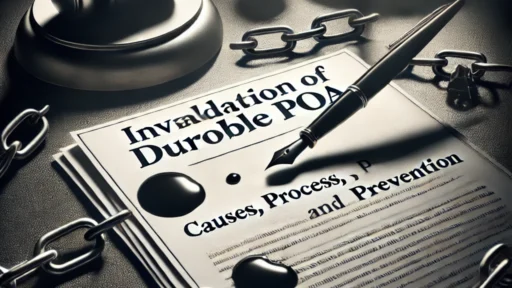Navigating legal matters can be daunting, and understanding the nuances of a power of attorney (POA) in Louisiana is no exception. A POA is a legal document granting someone the authority to act on another’s behalf, making it a crucial tool for managing personal, financial, and medical affairs. Whether planning for the future or addressing an immediate need, knowing how a POA works in Louisiana can provide peace of mind.
Louisiana’s unique legal landscape, influenced by both civil and common law traditions, adds specific requirements and considerations for creating a POA. From designating an agent to understanding the scope of their authority, it’s essential to grasp the details to ensure the document meets all legal standards. This article will guide you through the key aspects of establishing a power of attorney in Louisiana, empowering you to make informed decisions.
Understanding Power Of Attorney In Louisiana
A power of attorney (POA) in Louisiana authorizes one person to act on another’s behalf. The roles can include managing finances, handling property transactions, or making medical decisions. Louisiana law recognizes several types of POAs, each serving different purposes and offering varying degrees of authority.
Types Of Power Of Attorney
- General Power Of Attorney
Grants broad powers over an individual’s financial and personal matters. Examples include operating bank accounts, signing checks, or buying insurance. - Limited Power Of Attorney
Provides specific, restricted authority. Instances include selling a property or making investment decisions. - Durable Power Of Attorney
Remains effective even if the principal becomes incapacitated. Essential for long-term planning involving health care and financial oversight. - Medical Power Of Attorney
Allows an agent to make medical decisions on behalf of the principal. This is critical when the principal cannot make decisions due to health conditions.
Legal Requirements In Louisiana
- Written Document
A POA must be documented in writing to be legally binding. - Signature
Both the principal and the agent must sign the POA. - Notarization And Witnesses
Most POAs require notarization and witnesses. This ensures authenticity and prevents fraud. - Specific Language
Louisiana mandates precise legal language to clearly define the scope and authority granted in the POA.
Creating a power of attorney in Louisiana requires a few critical steps to ensure the document is valid and enforceable under the state’s civil law system:
1. Choose the Right POA Type: Determine whether the situation calls for a General, Limited, Durable, or Medical POA. Consider the scope of authority and whether long-term coverage is needed.
2. Draft the POA Document: Clearly define the agent’s powers and limitations. The document should include full legal names, addresses, and a detailed description of authorized actions.
3. Notarize and Witness the Document: In Louisiana, notarization is essential for most POAs. Having at least two adult witnesses sign the document can offer extra protection against future disputes.
4. Distribute and Store Securely: Provide copies to the agent and other relevant parties such as banks or healthcare providers. Keep the original in a safe, accessible location.
Revocation And Termination
A POA in Louisiana can be revoked if the principal updates or cancels it. Termination occurs automatically if the principal dies or becomes incapacitated unless the POA is durable. Explicitly writing a revocation ensures clarity in legal proceedings.
When selecting an agent for your Louisiana POA, prioritize these characteristics:
Trustworthiness: The agent must act in the principal’s best interest at all times.
Reliability: They should manage tasks diligently and make timely decisions.
Communication Skills: A good agent communicates clearly with doctors, lawyers, and financial institutions.
Financial Acumen: Especially important for General and Durable POAs that involve banking or investments.
Proximity: Physical closeness to the principal is helpful in emergencies.
No Conflicts of Interest: Avoid agents who might have personal interests that could interfere with the principal’s wishes.
Importance Of Legal Advice
Consulting an attorney ensures the POA satisfies Louisiana’s legal specifications. Attorneys help draft documents, clarify terms, and navigate complex legal landscapes to protect both the principal and the agent.
Understanding these facets of power of attorney in Louisiana aids in making informed decisions and ensures compliance with state laws.
Benefits Of Having A Power Of Attorney
Having a power of attorney (POA) in Louisiana ensures that personal, financial, and medical matters are managed effectively. POAs provide peace of mind by empowering a trusted agent to act on one’s behalf when unable to do so.
Financial Management
A power of attorney facilitates seamless financial management by granting an agent authority to handle financial activities. For instance, the agent can:
- Access Bank Accounts: Manage deposits, withdrawals, and transfers.
- Pay Bills: Ensure timely payment of utilities, loans, and other obligations.
- Conduct Real Estate Transactions: Buy, sell, or lease property as needed.
- Invest Assets: Make investment decisions aligned with the principal’s financial goals.
These capabilities ensure consistent financial management, even if the principal becomes incapacitated.
Healthcare Decisions
A medical power of attorney empowers an agent to make healthcare decisions, ensuring that medical preferences are respected. The agent’s authority includes:
- Consent to Treatments: Approve or decline medical procedures based on the principal’s wishes.
- Access Medical Records: Obtain necessary health information to make informed decisions.
- Choose Healthcare Providers: Select doctors, specialists, and medical facilities.
- End-of-Life Choices: Uphold the principal’s directives regarding life-sustaining treatments.
Granting a trusted individual the power to make healthcare decisions ensures the principal’s medical preferences are honored during critical times.
Beyond financial and healthcare management, POAs in Louisiana offer several extended benefits:
Avoid Court-Appointed Guardianship: A valid POA eliminates the need for a court to appoint a guardian, saving time and expense.
Asset Protection: Agents can act swiftly in emergencies to protect the principal’s assets from loss or mismanagement.
Business Continuity: For entrepreneurs, a POA ensures someone can legally act on their behalf to keep operations running.
Legal Representation: Agents can manage legal documents, sign contracts, and represent the principal in court if authorized.
How To Choose An Agent
Selecting the right agent for a power of attorney (POA) in Louisiana is crucial to ensure your affairs are managed effectively. Consider the following factors when choosing an agent:
Qualifications
An agent should meet specific qualifications to serve effectively. They must be an adult, typically 18 years or older, to enter into legal agreements. Knowledge in financial or healthcare matters is essential for managing the principal’s affairs. For instance, someone with a background in finance may handle a general POA better, while a healthcare professional might be ideal for a medical POA.
Trustworthiness
Trust is paramount when designating an agent. Choose someone who has demonstrated reliability and integrity in past dealings. It’s essential the agent acts in the principal’s best interests, for they will have substantial control over personal, financial, or medical decisions. Ensure your selected agent understands and respects your wishes, values, and preferences.
Common Misconceptions
Many people confuse the power of attorney (POA) types, assuming one form covers all needs. General POAs, for example, can handle various financial matters but lack authority in healthcare decisions. Specific POAs, such as medical POAs, address only healthcare choices and cannot manage financial tasks.
Another misconception lies in the perceived permanence of POAs. Some believe a POA is always effective indefinitely, but this isn’t true. Non-durable POAs terminate when the principal becomes incapacitated, unlike durable POAs, which remain valid regardless of the principal’s mental state.
A third common misunderstanding involves the agent’s power. Many assume agents have unlimited control once appointed. However, POA documents can include specific limitations, detailing allowed actions, and forbidden ones. Principals retain the ability to revoke a POA at any time, provided they are mentally competent.
Additionally, people often think that creating a POA automatically means relinquishing independence. In reality, POAs only come into effect under circumstances specified in the document, allowing principals to maintain decision-making power unless they explicitly restrict it.
Lastly, there is a belief that POAs are simple to create without legal help. While it’s possible to draft a POA independently, seeking legal advice ensures compliance with Louisiana laws, safeguarding the interests of both principal and agent. This protects against potential future disputes and issues.
Misinterpretations about POA usage and limitations can lead to inadequate planning and unintended consequences. Understanding these misconceptions helps individuals make informed decisions, ensuring their affairs are managed effectively according to their wishes.
Discover the Power of BlueNotary:
Integrate your Business, Title Company, or Law Firm to Satisfy your Customers and Decrease Turnaround
Get a document Notarized/Sign-up
Join the Free Notary Training Facebook Group
Conclusion
Understanding the nuances of power of attorney in Louisiana is essential for anyone looking to protect their interests and ensure their wishes are respected. By recognizing the different types of POAs and the importance of choosing a reliable agent, individuals can manage their personal, financial, and medical matters more effectively. Dispelling common misconceptions about POAs helps people make informed choices, aligning their decisions with Louisiana’s legal framework. Properly established POAs provide peace of mind, knowing that their affairs will be handled according to their preferences.
Frequently Asked Questions
What is a power of attorney (POA) in Louisiana?
A power of attorney (POA) in Louisiana is a legal document that grants a designated agent the authority to manage personal, financial, and medical matters on behalf of an individual.
What are the types of power of attorney available in Louisiana?
In Louisiana, the main types of POA include General POA, Limited POA, Durable POA, and Medical POA. Each serves different needs and provides varying levels of authority to the agent.
How do I establish a power of attorney in Louisiana?
To establish a POA in Louisiana, you must complete a legal document specifying the type of POA and name a trustworthy agent. It often requires notarization and may need to meet specific state legal requirements.
Can a power of attorney be permanent?
No, not all POAs are permanent. The duration and terms depend on the type of POA created. For instance, a General POA typically ends if the principal becomes incapacitated, whereas a Durable POA remains effective.
Does a power of attorney affect my independence?
Granting a POA does not affect your independence as long as you are capacitated. It simply allows your appointed agent to act on your behalf when necessary.
How much power does my agent have under a POA?
The power your agent has depends on the type of POA. It can range from specific tasks in a Limited POA to broad authority in a General or Durable POA, adhering to the limitations set within the document.
Is it necessary to have a lawyer to create a POA?
While not legally required, consulting a lawyer is highly recommended to ensure the POA is properly drafted and meets all legal requirements, preventing fraud any potential issues in the future.







